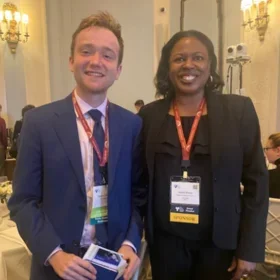At the forefront of political analytics education, Columbia University’s M.S. in Political Analytics program offers a unique capstone experience that immerses students in real-world challenges. This vital course is designed to equip students with the analytical skills necessary to tackle complex political issues, preparing them for diverse career paths, particularly in campaign work.
The capstone serves as a culmination of students’ academic journey, allowing them to engage with pressing political analytics challenges faced by sponsoring organizations. The objectives are clear: to provide a hands-on experience that simulates real-world political decision-making while also helping students apply the knowledge and frameworks they’ve acquired throughout the program.
“The capstone enables students to apply their analytical skills to complex political issues, ultimately preparing them for a variety of career options,” says Michael Schwam-Baird, deputy director of the Political Analytics program. This direct application of classroom learning to actual political scenarios is a distinctive feature of the program.
As students embark on their capstone projects, they delve into real data and address significant questions posed by their clients. Schwam-Baird notes, “Students will scope problems, acquire data, conduct analyses, and present findings and recommendations to project sponsors.” This process not only enhances their analytical skills but also equips them with the ability to communicate complex findings effectively. The capstone experience also challenges students to identify and apply appropriate analytical tools to solve real-world political problems. Schwam-Baird explains that students often face hurdles such as “scoping the project so that it’s doable within a term” and “effectively communicating findings in ways that are appropriate to their audience.”
Collaboration with external organizations is a core aspect of the capstone course. Students engage with real clients, fostering connections that can lead to professional opportunities. As they present their findings to partner organizations and peers, they gain valuable experience and networking prospects within the field.
The program’s inaugural cohort has already seen impressive outcomes. With two completed projects to date, one student, Benny Rosenzweig, secured a position with the analytics team on the Harris presidential campaign.
Rosenzweig’s capstone, “Neural Networks for Data Science: A Case Study in Voter Turnout,” focused on specialized neural networks, a machine learning model, and its potential for generating better predictions of voter turnout (as well as other outcomes) than most of the models currently in use.. In discussing his capstone project, Rosenzweig says that “there may be far more appropriate applications for other predictive tasks with high-dimensional data.”
Schwam-Baird notes that “Benny’s capstone work impressed a number of potential employers, including the Harris campaign.”
The other capstone student, Trevor Sepulveda, is now pursuing his master’s in Public Policy at UC Berkeley. Sepulveda’s capstone, titled “Leveraging Sentiment Analysis to Gauge Political Rhetoric,” examined the online communications of U.S. Senators on Twitter and Facebook during the nomination of Brett Kavanaugh to the Supreme Court. A counterintuitive finding of his capstone, Sepulveda says, is that the sentiment of “trust actually dominated [Senator posts] during the Kavanaugh hearings,” as opposed to rage or anger.
Looking ahead, Schwam-Baird anticipates evolving trends in political analytics, particularly with the impact of generative AI on political communication. For prospective students, Schwam-Baird emphasizes the importance of early communication about interests and project ideas. “If you have a group you want to work with,” he encourages, “we can work with you to communicate with them about a potential project.” He advises students to keep abreast of current events and trends, ensuring their projects are not only relevant but also grounded in rigorous analytics.
About the Program
The Columbia University M.S. in Political Analytics program provides students quantitative skills in an explicitly political context, facilitating crosswalk with nontechnical professionals and decision-makers—and empowers students to become decision-makers themselves.
The 36-credit program is available part-time and full-time, on-campus and online. The fall 2025 application priority deadline for the M.S. in Political Analytics program is February 15. The final deadline is June 1. Learn more about the program here.
For general information and admissions questions, please call 212-854-9666 or email politicalanalytics [[at]] sps [[dot]] columbia [[dot]] edu (politicalanalytics[at]sps[dot]columbia[dot]edu).


